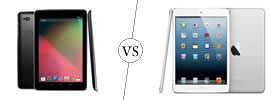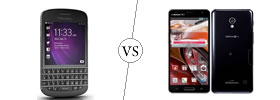Difference between HTC One X+ and HTC One
Key Difference: The HTC One X+ sports a 4.7-inch super LCD 2 touch screen with approximately 312 ppi pixel density, meaning the screen is pretty awesome and it does not show any pixels. The device is powered by 1.7 GHz Quad-core NVIDIA Tegra 3 process making it faster than the original HTC One X. HTC was expected to launch its flagship phone HTC One in March 2013 with a brand new Qualcomm quad-core processor but has postponed the launch to an unknown date in April. HTC One sports a 4.7 inch Super LCD3 screen, with Full HD1080p, 468 PPI and corning gorilla glass 2.

HTC is a popular smartphone company and has been touted for many beautifully designed phones. The phones are smart, sleek and to the point with no extra marketing gimmick. HTC maintains this with the launch of the HTC One X+. The HTC One X+ is a new phone that shares many similarities to its big brother the HTC One X; however, it also shines in many places where the predecessor shied. The HTC One X+ is basically an upgraded version of the HTC One X and hit the market in November 2012.
The HTC One X+ sports a 4.7-inch super LCD 2 touch screen with approximately 312 ppi pixel density, meaning the screen is pretty awesome and it does not show any pixels. The screen has excellent resolution and shows sharp and crisp clear photos and videos. The screen is protected by Corning Gorilla Glass 2 that keeps it from getting minor day-to-day scratches. The device is sleek and thin in general, but has put on a little extra weight (5 grams) compared to the original One X. The phone is covered in a soft-touch polycarbonate plastic chassis that has smooth curved corners. The soft matte plastic makes it easy to grip the phone and keeps it from slipping through the fingers. The phone comes incorporated with the HTC Sense UI v4+, which is basically a combination of the HTC Sense and Jelly Bean. The combination of the two provides additional features such as: Google Now, Voice search, faster screen navigation, new gallery app (organizes photos by events and location) and HTC Get Started (allows PC to configure the phone faster).
The device is powered by 1.7 GHz Quad-core NVIDIA Tegra 3 process making it faster than the original HTC One X. The faster processor allows seamless transitions between apps and makes the device smooth to work with. There was no hindering or jerking when operating the device. The One X+ comes installed with Android v4.1 (Jelly Bean) right out of the box. The device comes with 32 and 64 GB internal storage capacity that is not expandable and 1 GB RAM.
The device houses an 8 MP rear camera with auto focus, LED flash, and BSI sensor, along with a 1.6 MP front camera for video conferencing. The front camera also has a countdown features that counts down to the moment the picture is being taken to ensure that the user is camera ready. The camera comes with many additional features that help the phone stand out against all the other devices. The features include: F2.0 aperture and 28mm lens, Dedicated HTC ImageChip, VideoPic, Continuous shooting, Smart Flash, Sightseeing mode, Video stabilization, Slow motion video capture and playback and ImageSense. The ImageSense allows the phone to take faster and the best photos under any lighting. The VideoPic is a new feature that allows users to take images while recording a video as well as taking an image when playing an already recorded video. The Smart Flash provides five levels of flash that adjust automatically when trying to take a shot, while the Sightseeing mode allows the camera to be handy during outings, so that it can be easily accessible.
The device houses a non-removable 2100 mAh Lithium-ion Polymer battery, which according to tests by many review website, dies pretty quickly. When fully-working the battery does not even last a whole day. However, no official data has been released by the company regarding the Talk-time and the Stand-by time. The company has also added the Beats Audio sound enhancement to its speakers as well as headset and it can be turned on and off by the user. The phone has been a popular hit with many that require a good sturdy budgeted phone with an excellent camera.

HTC was expected to launch its flagship phone HTC One in March 2013 with a brand new Qualcomm quad-core processor but has postponed the launch to an unknown date in April according to Engadget. It is expected to give direct competition to iPhone 5 and Galaxy S4. In terms of hardware and software, HTC One sports a 4.7 inch Super LCD3 screen, with Full HD1080p, 468 PPI and corning gorilla glass 2. The HTC One comes with Android v4.1.2 Jelly Bean that is upgradable to v4.2.2. The case is an all-aluminum frame with an antenna built into its backing. It includes a 1.7 GHz quad-core Snapdragon 600 processor, Adreno 320 GPU and 2 GB DDR2. The phone is available with non-expandable, 32 or 64GB internal capacity. It offers a 4 megapixel 2688 x 1520 pixels primary camera with autofocus, LED flash and BSI sensor, along with a 2.1 MP, 1080p@30fps, HDR secondary camera. The main feature is the new pixilation system that is opted in the primary camera of the phone, which provides each pixel size of 2.0 µm and sensor size of 1/3'.
The One also includes a new camera app known as ‘Zoe’, which records a short video alongside every photo taken and allows the resulting photos and videos to be automatically combined and synchronized with music to produce a multimedia presentation known as a Zoe. The One also offers a new feature on the home screen known as the BlinkFeed. This is a newsfeed that automatically upgrades every two hours if connected with a mobile service or more frequently when connected via WiFi. The BlinkFeed takes up the main home screen and cannot be removed, resulting in the home screen as not being as customizable as in the previous phones. The price of the phone has not yet been released.
The information for the detailed table about the two phones has been taken from HTC website and GSMArena.com.
|
|
HTC One X+ |
HTC One |
|
Launch Date |
November 2012 |
Expected release April 2013 |
|
Company |
HTC |
HTC Corporation |
|
Size |
134.36 x 69.9 x 8.9mm |
137.4 x 68.2 x 9.3mm |
|
Display |
4.7 inch super LCD 2 touch screen |
4.7 inch Super LCD3 |
|
Screen |
720 x 1280 pixels (~312 ppi pixel density) |
1080p, 468 PPI (Full HD) |
|
Protection |
Corning Gorilla Glass 2 |
Corning Gorilla Glass 2 |
|
Weight |
135 grams |
143g |
|
2G Network |
GSM 850 / 900 / 1800 / 1900 |
HSPA/WCDMA: Europe/Asia: 850/900/1900/2100 MHz |
|
3G Network |
HSDPA 850 / 900 / 1900 / 2100 HSDPA 850 / 1900 / 2100 - for AT&T |
GSM/GPRS/EDGE: 850/900/1800/1900 MHz |
|
4G Network |
LTE 700 MHz Class 17 / 1700 / 2100 - for AT&T |
Depends on market availability. |
|
GUI |
HTC Sense UI v4+ |
HTC Sense 5 |
|
CPU speed |
1.7 GHz Quad-core NVIDIA® Tegra® 3 |
Qualcomm® Snapdragon™ 600, quad-core, 1.7GHz |
|
GPU |
ULP GeForce 2 |
Adreno 320 |
|
OS |
Android OS, v4.1.1 (Jelly Bean) |
Android OS, v4.1.2 (Jelly Bean), upgradable to v4.2.2 (Jelly Bean) |
|
Chipset |
NVIDIA Tegra 3 AP37 |
Qualcomm APQ8064T Snapdragon 600 |
|
RAM |
1 GB |
2 GB DDR2 |
|
SIM Size |
microSIM |
microSIM |
|
Internal Memory |
32/64 GB |
32/64 GB |
|
Expandable Memory |
No |
No |
|
Sensors |
Gyro sensor, G-Sensor, Digital compass, Proximity sensor, Ambient light sensor |
Gyro sensor, Accelerometer, Proximity sensor, Ambient light sensor. |
|
Connectivity |
3.5 mm stereo audio jack, NFC capable, Compliant with Bluetooth 4.0, Bluetooth with aptX™ enabled, Wi-Fi®: IEEE 802.11 a/b/g/n, DLNA®, micro-USB 2.0 (5-pin) port with mobile high-definition video link (MHL) for USB or HDMI connection |
Compliant with Bluetooth 4.0, Bluetooth 4.0 with aptX™ enabled, Wi-Fi: IEEE 802.11 a/ac/b/g/n, DLNA, micro-USB 2.0, |
|
Data |
GPRS, EDGE, WLAN, Bluetooth, NFC, USB. |
GPRS, EDGE, WLAN, Bluetooth and USB. |
|
Speed |
HSDPA, 21 Mbps; HSUPA, 5.76 Mbps - Global version / HSDPA, 42 Mbps; HSUPA, 5.76 Mbps; LTE |
HSPA+; LTE, Cat3, 50 Mbps UL, 100 Mbps DL |
|
WLAN |
Wi-Fi 802.11 a/b/g/n, dual-band, DLNA, Wi-Fi hotspot |
Wi-Fi 802.11 a/ac/b/g/n, Wi-Fi Direct, DLNA, Wi-Fi hotspot |
|
Bluetooth |
Bluetooth v4.0 with A2DP |
Compliant with Bluetooth 4.0, Bluetooth 4.0 with aptX™ enabled |
|
USB |
microUSB v2.0 (MHL) |
micro-USB 2.0. |
|
Primary Camera |
8 MP camera with auto focus, LED flash, and BSI sensor |
4 megapixel 2688 x 1520 pixels, autofocus, LED flash BSI sensor, Pixel size 2.0 µm, Sensor size 1/3', Dedicated HTC ImageChip™ 2 F2.0 aperture and 28 mm lens |
|
Secondary Camera |
1.6 megapixel front camera (720p for video recording) |
2.1 MP, 1080p@30fps, HDR |
|
Video |
1080p HD video recording |
1080p@30fps, HDR, stereo sound rec., video stabilization |
|
Camera Features |
|
|
|
Sound Enhancement |
Beats Audio |
HTC BoomSound, Dual frontal stereo speakers with built-in amplifiers, Beats Audio, HDR Microphone and Sense Voice. |
|
Audio supported formats |
.aac, .amr, .ogg, .m4a, .mid, .mp3, .wav, .wma |
Playback: .aac, .amr, .ogg, .m4a, .mid, .mp3, .wav, .wma (Windows Media Audio 9) Recording: .amr |
|
Video supported formats |
.3gp, .3g2, .mp4, .wmv (Windows Media Video 9), .avi (MP4 ASP and MP3) |
Playback: .3gp, .3g2, .mp4, .wmv (Windows Media Video 9), .avi (MP4 ASP and MP3) Recording: .mp4 |
|
Battery Capacity |
Non-removable 2100 mAh Li-ion Polymer battery |
2300 mAh |
|
Talktime |
No official data released |
No official data released |
|
Standby Time |
No official data released |
No official data released |
|
Available Colors |
Black, White |
Gray, White, Black, with more colors to come. |
|
Messaging |
SMS(threaded view), MMS, Email, Push Mail, IM, RSS |
SMS (threaded view), MMS, Email, Push Email |
|
Browser |
HTML5, Adobe Flash |
HTML, Adobe Flash |
|
Radio |
Stereo FM radio with RDS |
Stereo FM radio with RDS |
|
GPS |
GPS with A-GPS support and GLONASS |
A-GPS support |
|
Java |
Java with Java MIDP emulator |
Java MIDP emulator |
|
Additional Features |
|
|
Image Courtesy: htc.com, anandtech.com









Add new comment